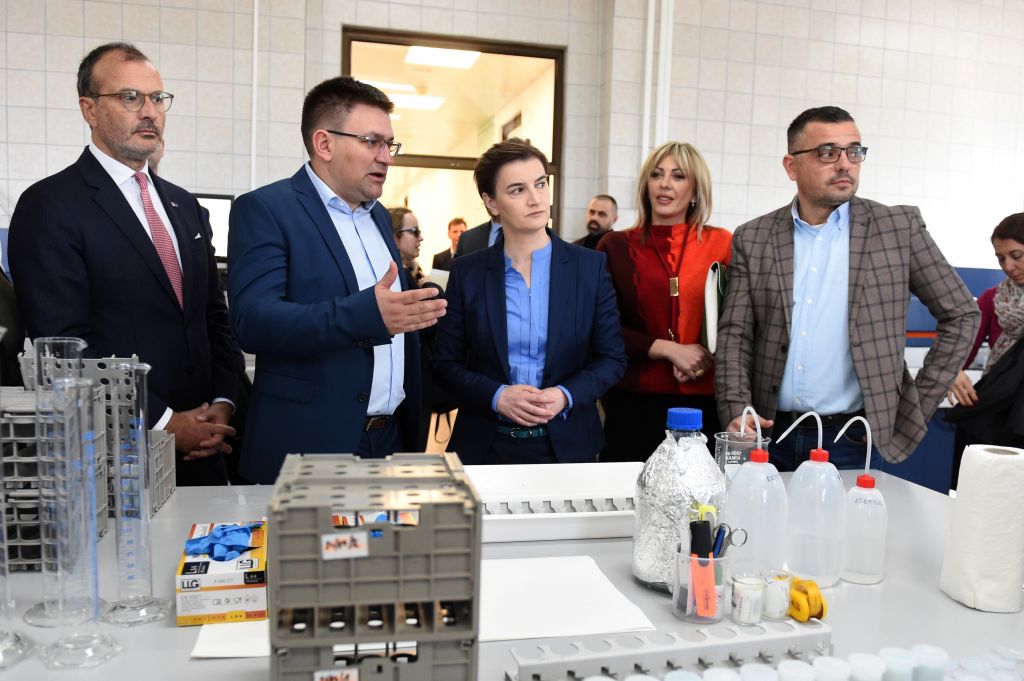
Minister of European Integration Jadranka Joksimović has said that the project, which was launched in 2010 with funding from EU pre-accession funds, was “about to collapse” due to “the misapplication of funds and irresponsible behaviour of previous governments until 2012.”
“Since 2014, we have managed to “unfasten” this project by allocating considerable budget funds so as to compensate what was spent and so that the EU can continue to finance the project in segments such as laboratory equipment,” stated Joksimović.
The Minister has said that the EU funded the project with eight million euros and that the Serbian Government participated with around three million euros.
“Through joint work and synergy, we have managed to ensure the work of the umbrella institution for food quality control, important for our citizens and producers who want to place goods on the European market,” emphasised Joksimović.
Joksimović has stated that the current level of aflatoxins in milk in Serbia is not fully aligned with the EU, but that this does not mean that this amount threatens the safety of citizens.
“This is not something that is negative and that is contrary to food safety, but it is not fully aligned with what others have achieved by joining the EU,” said Joksimović, adding that the common agricultural policy is very demanding and complicated.
As she has explained, all countries that negotiated with the EU took some transitional periods, because, unlike Member States that have a number of subsidies that raise the competitiveness of their producers, candidate countries do not have them available.
“And tomorrow, our producer will have to enter the demanding EU market without being ‘crushed’, and transitional periods are in this sense taken for various levels of alignment with the EU parameters.
All milk producers will have to test their products twice a month at the National Milk Control Laboratory, Serbian Prime Minister Ana Brnabić said after visiting the Directorate for National Reference Laboratories. She has added that the tests will be free, and that each producer will receive guidelines on what to do if the quality of their products deviates from the European standards.
“The fact that Serbia now has an accredited National Laboratory means greater safety and better food quality for our citizens, and for producers - standardization of product quality and fair market,” said Brnabić.
Minister of Agriculture Branislav Nedimović has said that Serbia will have the Laboratory for Food Safety in May or June, adding that the National Milk Control Laboratory is important for determining the quality of milk and dairy products on the market.
The existence of national, accredited laboratories for food control is also important for meeting the requirements for the opening of Chapter 12 related to food safety.
“We have adopted new rulebooks on meat, eggs, etc.; we are helping producers to enter other markets," emphasised Nedimović.
Asked whether Serbia aligned the aflatoxin values in milk with European standards, he said that Serbia “is striving to do so”, but that the level of aflatoxins in Serbia is still 0.25 micrograms per litre, while in the EU countries it is 0.05 micrograms.
“Serbia exports milk to neighbouring countries and the standards are in line with their regulations. We do not have large enough quantities of milk to export it to the EU,” Nedimović has said, recalling that the allowed level of aflatoxins for the USA is 0.5 micrograms per litre.
Head of the EU Delegation to Serbia Sem Fabrizi has said that the opening of a new accredited milk control laboratory is an important step not only in improving the safety and quality of food in Serbia, but also for Serbia’s path to EU membership.
He has underlined that Chapter 12, which relates to food safety and quality, is the most complex and technically most demanding chapter in the process of EU membership negotiations. “Serbia deserves to have the best standards in terms of food quality, and this centre provides additional encouragement in the process of Serbia's EU accession,” said Fabrizi.
He has added that 4.5 million euros, out of eight million that the EU has allocated for the Directorate, was invested in the reconstruction of the centre, and the rest in employee training.
Source: Tanjug








